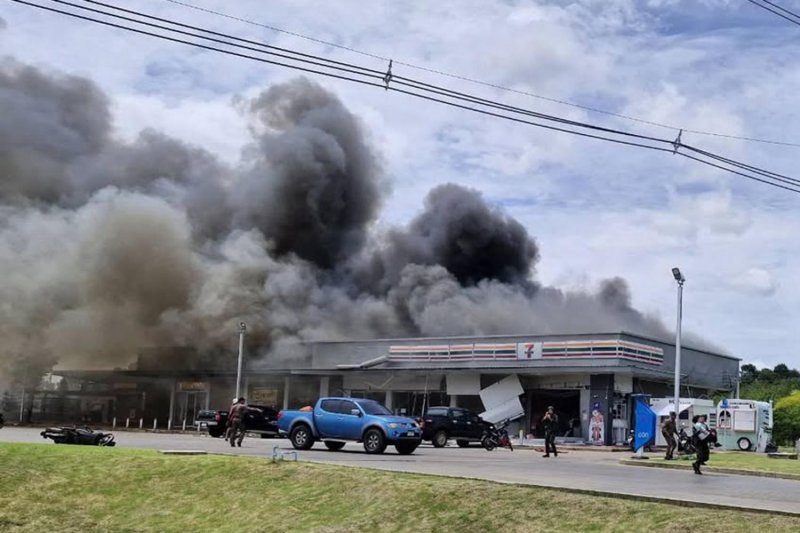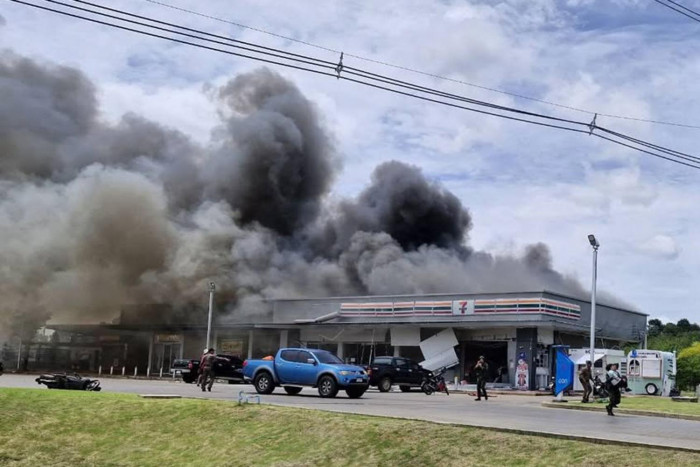
A BM21 rocket fired from Cambodia struck a convenience store at a PTT petrol station in Ban Phue, Kantharalak district, in Si Sa Ket on July 24.
The Thai-Cambodian territorial conflict has curtailed border trade and raised worries over the future of Thai businesses in the neighbouring country, as well as Cambodian workers in Thailand.
In July when severe clashes between the two countries erupted, border trade shrank, with exports plummeting by 97.5% year-on-year to 370 million baht, while imports plunged by 99.8% to 6 million baht, according to the Department of Foreign Trade.
Thai entrepreneurs in Cambodia are gripped by concerns, making them reluctant to draw up business plans, while employers in Thailand face a sharp decline in Cambodian workers.
The Explainer looks into their concerns and what they are doing to deal with the impact of the months-long dispute, which is far from settled.
Will Thai businesses withdraw from Cambodia?
It is not easy for many Thai companies, especially those in the manufacturing sector, to leave Cambodia as they spent millions of baht building production facilities there.
“Some manufacturers are in labour-intensive industries such as garments and textiles and shoes. They are expected to continue working there,” said Tanit Sorat, vice-chairman of the Employers’ Confederation of Thai Trade and Industry (EconThai).
These manufacturers benefit from cheap labour, enabling them to better control production costs and enhance productivity.
However, Mr Tanit said Thai companies in the service and financial sectors can more easily decide to suspend or shut down their businesses.
EconThai held talks with Thai companies, mostly small and medium-sized enterprises, about the impact of the territorial dispute. These companies were in the garment and textiles, shoes, hotel and restaurant sectors.
“Thai entrepreneurs are very concerned about the situation, but they are staying quiet,” he said.
They do not want to cause any problems with locals or the Cambodian government, said Mr Tanit. Many of them have invested in Cambodia for more than a decade.
Sisophon Industrial Park in Serei Saophoan city, Banteay Meanchey province, is where some of these Thai businesses are based, only 50 kilometres from Sa Kaeo province in Thailand.
What are the prospects for Thai investment in Cambodia?
He said new investment projects from Thailand will be completely halted if the conflict shows no sign of abating.
Banks and financial institutions are unlikely to approve loans for business expansion while the situation remains volatile, said Mr Tanit.
Many companies that want to expand abroad, especially in Southeast Asia, are looking for new investment destinations other than Cambodia to avoid the uncertainty of Cambodian military attacks on Thai civilians and their assets, he said.
A rocket strike on a filling station in Si Sa Ket’s Kantharalak district killed eight people and injured 13 others on July 24.
“It is difficult to restore diplomatic ties between Thailand and Cambodia because people on both sides hate each other now,” said Mr Tanit.
“Thai entrepreneurs are worried about a repeat of the furious riot in Cambodia more than 20 years ago.”
In early 2003, the Thai embassy in Phnom Penh was burned by rioters and several Thai-owned businesses in Cambodia were attacked following a rumour that a Thai actress had claimed that Angkor Wat — Cambodia’s prized cultural icon — belonged to Thailand. An evacuation of Thai citizens followed the riots.
Large companies are seeking new business opportunities in other countries, including Vietnam, Indonesia and Bangladesh, he said.
They want to benefit from inexpensive operating costs and large populations in these markets, said Mr Tanit.
How are employers in Thailand affected by the conflict?
Employers in many businesses are facing a labour shortage after several thousand Cambodian workers decided to return to their country, though EconThai does not believe this will deal a heavy blow to entrepreneurs.
“The government extended work permits for migrant workers to ease the short-term impact,” said Mr Tanit, also chairman of the National Labour Development Advisory Council.
The working period extension applies to Cambodian, Laotian, Vietnamese and Myanmar workers in Thailand.
Before these Cambodian workers decided to head home, Thailand had a total of 3.8 million migrant workers from these four countries, including some without work licences, according to EconThai. Workers from Myanmar account for 80% of such labourers.
After the departure of Cambodian labourers, workers from other countries, especially Myanmar, replaced them thanks to the work permit renewal measure, he said.
Local employers also offered higher wages to migrant workers asked to increase shifts to offset the reduction in Cambodian workers, said Mr Tanit.
Cambodians usually work in the agricultural, fishing, manufacturing and construction sectors.
Fewer Cambodian workers also prompted local manufacturers to speed up plans to replace labourers with machinery, said the Federation of Thai Industries (FTI).
In the long term, companies can adapt to fewer labourers by investing more in automation, enabling them to cut costs and enhance production efficiency, said Kriengkrai Thiennukul, chairman of the FTI.
